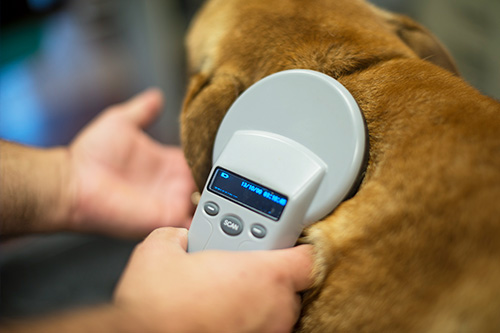Microchipping is a safe, permanent way to identify your pet in case he or she becomes lost and needs help being reunited to you, or can be used for international travel purposes. A microchip, which is a tiny device about the size & shape of a grain of rice, is placed just under the loose skin at the back of the neck. When a lost dog or cat without an ID tag is found, a handheld microchip scanner is used to check for a chip. If the pet has one, it will transmit its ID number to the scanner via a low-frequency radio wave. The veterinary hospital or animal shelter then calls the chip manufacturer, retrieves the pet owner’s contact information, and calls the owner.
Even the most responsible pet owners can’t always guarantee their pet won’t get lost. A leash could break or slip out of your hand, a pet could push through a screen door or window, or a contractor or friend might accidentally leave a door or gate open.
We recommend that you use a microchip, along with a collar and ID tag, to identify your pet. An ID tag is still a reliable identification method. Pets that have tags with current contact information are more likely to not end up in shelters and tend to get home faster than those without tags. However, collars and ID tags aren’t permanent and can be removed or lost. With a microchip, your pet will have a much better chance of being identified and returned to you.
**Remember – your microchip is only as valuable as the information associated with it! Please always update your microchip registry anytime your contact information, especially your phone number, is changed**
Please contact us to schedule an appointment to microchip your pet. Although we hope your pet never becomes lost, we want you to be prepared. While we can microchip awake pets, our surgery team will also inquire on intake for routine procedures if you would like your pet microchipped while asleep.
If you need your pet, or an animal you have found, scanned for their chip number please contact our clinic, or alternatively, the local OSPCA on Highway 12.

